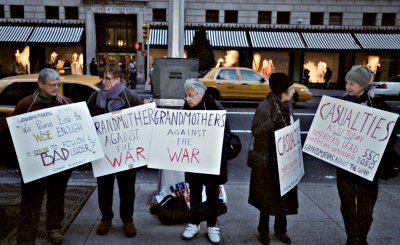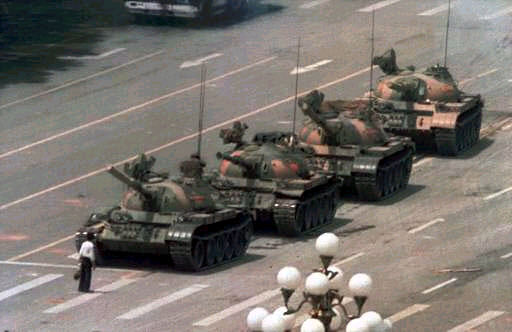
Dynamics

|
Generational Dynamics |
| Forecasting America's Destiny ... and the World's | |
| HOME WEB LOG COUNTRY WIKI COMMENT FORUM DOWNLOADS ABOUT | |
You hear a lot of criticism of these days of the young generation -- "Generation Y" or "the Millennial Generation" -- born since the early 1980s. They're not involved enough in politics, according to the critics, and worst of all, they don't protest against the Iraq war.
These criticisms are usually leveled by people in the Baby Boomer generation. In the 60s, when the Boomers were in college, they rioted and demonstrated against the war and brought down two Presidents, Johnson and Nixon.
Every Boomer has fond memories of the weekly demonstrations, especially the good-looking coeds in their cute outfits, yelling and screaming about the war and racism and about women's lib, sometimes threatening to burn their bras. Believe me, nothing going on today is even remotely comparable to those scenes.
I've been saying since early in 2003 that there would be no significant antiwar movement in this generational crisis period. This prediction has turned out to be true, despite repeated predictions by pundits that an anti-war movement would take off any day now. Whenever some anemic demonstration flared up, I would write an article asking the same question: Where are the college students?
 |
To a Boomer like me who was actually around in the 60s, an organization like "Grannies against the war" is bizarre and absurd. If these women talked about burning their bras, everyone would run for the hills.
Nonetheless, the journalists, politicians and pundits are totally clueless about what's going on. CBS News political columnist Dottie Lynch at least has the sense to ask what's going on: "But as the war in Iraq rages on I keep asking myself: Where are the young people this time around? Where are the campuses? Where are the new Tom Haydens and Sam Browns and where are the Noam Chomskys, William Sloane Coffins and Daniel Berrigans?"
(If you don't recognize any of those names, then you're probably younger than 45. Anyway, they're the names of famous 1960s antiwar protesters.)
She's totally baffled. She notes that students traveled to New Orleans to help out after Katrina, and a few students protested the genocide in Darfur. But no students are protesting against the war. Is it because too few students are actually soldiers in the war? Is it because of the Abu Ghraib scandal - like "the images of My Lai are still seared in our brains." (If you don't know what My Lai was, then you're probably under 45. Anyway, it's the name of a place where American soldiers killed Vietnamese civilians.) Is it lack of leadership from Democrats?
No, she doesn't have a clue.
It never even OCCURS to her to wonder about a generational reason. Like so many journalists, she's completely sunken into the swamp of ideology, and can't see anything but an ideological issue. The concept that something is going on that George Bush has nothing to do with is so quaint and strange to her. I'm surprised she doesn't blame the weather on Bush.
Pundits on the right are no better, sometimes going so far as to hint that it's God's will that the anti-war movement fail.
A more sophisticated, but still wrong, argument is given by conservative pundit Shelby Steele, who at least recognizes that there's a generational issue: "The sixties generation of youth is very likely the first generation in American history to have actually won its adolescent rebellion against its elders. One of the reasons for this, if not the primary reason, is that this generation came of age during the age of white guilt, which meant that its rebellion ran into an increasingly uncertain adult authority."
This is closer to the truth, since it recognizes that the antiwar and anti-racism movements in the 1960s were a struggle between two generations, a dynamic that's completely missing today. However, he's wrong in saying that it's unique; actually it happens repeatedly in every society, about 20-40 years after a crisis war, in what's called "generational awakening" and "unraveling" periods:
It's always a generational struggle, and the younger generation almost always wins because, after all, they outlive the older the generation.
 |
An example of an incredibly dramatic generational awakening event -- and it was even televised! -- that climaxed with a win by the older generation is the 1989 Tiananmen Square massacre in China. In 1989, some three million students from all over China came to China, often by bicycling or hitchhiking, for peaceful demonstrations against government policies. Government troops entered Tiananmen Square at night and fired at the sleeping students. In the end, several thousand students were killed, and the demonstrations were dispersed.
So what happened in America in the 1960s and 1970s is actually quite common in history.
But that still doesn't answer the question: Why aren't today's college students actively protesting against the Iraqi war?
To answer that question, we have to look at different generations separately:
What's interesting to understand is that, strictly speaking, the demonstrating Boomers of the sixties were demonstrating against their parents, and the same Boomers are demonstrating against George Bush today. In neither case were they really demonstrating against war.
So none of this has anything whatsoever to do with ideology or George Bush. Everything that the politicians and pundits and journalists of either political party says about why college students aren't demonstrating is total, absolute nonsense.
If you'd like to understand more the interactions between generations, then read the best-selling books, Generations and The Fourth Turning, by the historians William Strauss and Neil Howe. Their work, done in the 1980s and early 1990s, forms the foundation of Generational Dynamics.
So what should we make of today's college students? Are they really as worthless as Boomers make them out to be?
Before I answer that directly, I'll tell a little anecdote.
I was recently talking to a college student, and I asked him to tell me what he thought about the violence in Sri Lanka. I got a blank look. Then I said, "OK, tell me absolutely anything you know about any international story of any kind whatsoever, in any country in the world." Nothing. "But surely you know something about what's going on in Iraq?" "Well," he said, "I read a little bit about it a year ago, but forgot about it."
Later, I spoke to my son Jason, who's a college student at Georgia Tech. He knows a fair amount about international events because ever since 9/11 he's often had to listen to me rant and rave about international events and generational issues. I asked him if he ever talks about news events with other students at school. He said that the subject never comes up. I asked him, "Have you ever heard any of the other students talk about any news events, even if you didn't participate in the conversation, even if they were just talking about it in the distance." He said he'd never heard a single conversation of that type. "Everyone is an engineering student. Maybe if they were history students then they would."
This is very strange, of course, to someone like me who went to MIT in the 1960s in the People's Republic of Cambridge, Massachusetts, where almost every discussion was about politics, and half the students carried around their copies of Chairman Mao's Little Red Book of Quotations in their back pockets.
But it never really is about politics, is it? It's always your relationship with your parents, and today's college students don't have the same issues with their parents that the Boomers had.
So let's get back to the question: Are today's college students really as worthless as Boomers make them out to be?
The answer is absolutely no. As we approach a new "clash of civilizations" world war, the Millennials generation will be the new generation of Heroes, taking their place as the next "greatest generation."
These Heroes are our young darlings. When the time comes and the nation is facing its greatest danger, these Heroes will go off to war fearlessly and do their duty. Without any thought for themselves, they'll go proudly and valiantly into battle, and they won't even be sad about it. It's their parents in the GenX and Boomer generations who'll be standing on the shore in tears, waving goodbye as their ships disappear over the horizon, knowing that we'll never see many of them again, but also knowing that there's no choice.